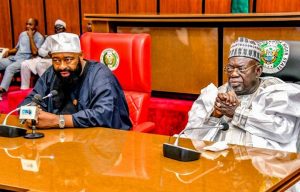

By correspondent in Minna.

Former Governor of Niger State, Dr. Mu’azu Babangida Aliyu, has attributed the recent flood disaster,which claimed over 260 lives,to the persistent refusal of riverine communities to relocate, citing myths tied to their ancestral homes.
Dr. Aliyu made the remarks on Tuesday during a condolence visit to Governor Mohammed Umar Bago at the Government House in Minna.
He expressed concern over the communities’ defiant stance, warning that their attachment to ancestral lands continues to endanger lives.
According to the former governor, repeated warnings and efforts to relocate residents from flood-prone areas have been met with resistance, often justified by what he described as “flimsy excuses.”
He lamented that such attitudes have led to a cycle of preventable tragedies.
“If not out of negligence, we must stop people from actions that pose threats to lives. Don’t assume the water isn’t coming,when it does, it will find its way, and the damage can be unimaginable,” he warned.
Aliyu urged Governor Bago to take firm measures to discourage habitation along riverbanks and the construction of buildings on drainage paths, which he described as “potential disasters waiting to happen.”
He recalled that in the past, life jackets and other safety materials were provided to affected communities, but noted that residents failed to use them responsibly.
Dr. Aliyu commended Governor Bago for his inclusive leadership, noting his unbiased approach to governance regardless of religion, ethnicity, or political affiliation.
He advised the governor not to take criticisms personally, stressing that constructive feedback is part of democratic governance.
Responding, Governor Bago expressed gratitude to the former governor for the visit and described him as “our leader and mentor.”
He praised Aliyu’s leadership legacy and noted that his administration is building on some of those foundations to realize the “New Niger” vision.
While acknowledging political diversity, Governor Bago emphasized that the development of Niger State should be a shared responsibility.
“People may operate from different political platforms, but the project called Niger should remain our collective dream,” he said.
Edited by Dada Ahmed.


